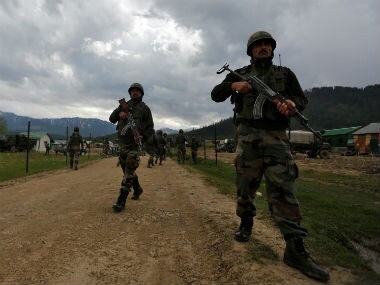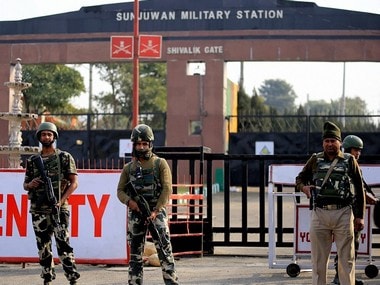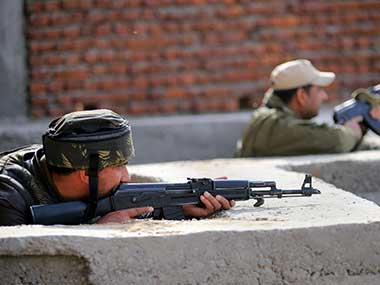New Delhi: A Colonel in Pakistan Army, Sajid Shahzad had admitted in its top-secret publication Green Book about Pakistan’s support to terror outfits. His analysis, meant for Pakistan's top security decision makers, reviewed by the Firstpost, clearly shows that the neighbouring country is determined to extend support to militants and separatists to create unrest in the Kashmir Valley.
The Pakistani officer, who visited the US for a course on ‘Terrorist Device Threat and Response’, wrote: “In view of the international climate, it has become necessary to shift emphasis gradually from armed struggle for the liberation of Kashmir to pursuit of the same objective by Kashmiri struggle."

Representational image. Reuters
Back home, during a meeting of top security and intelligence brass, immediately after the Sunjuwan Military Station in Jammu was attacked by a group of Jaish-e-Mohammed terrorists, the directive was clear: "Go for headhunting, target the top terrorist commanders and neutralise the local support."
Intelligence sources told Firstpost that the recent attacks on security forces and the shift in Pakistan's Inter-Services Intelligence (ISI) strategy in Jammu and Kashmir were on top of the agenda of the emergency meeting that examined terrorist’s strongholds and hideouts in the Valley.
"The chatters intercepted from across the border indicate the level of attacks against security forces may increase in the coming months, and the presence of local modules in terror strongholds is a point of concern. We need to improve our intelligence network and must focus across district boundaries for specific operations,” sources privy to the closed-door meeting said.
In the last two years — 2016 to 2017 — around 2,778 incidents related to attacks against security forces pickets and deployments were recorded by the agencies. The number of terrorist attacks also gone up from 299 in 2016 to 365 in 2017.
"The meeting also discussed close cooperation among agencies operating in the state — Indian Army, Jammu and Kashmir Police and the paramilitary forces — and their redeployment to launch an intelligence-based operation in terrorist hideouts,” sources said.
| Terror incidents in Kashmir (2016 and 2017) | |
| Terrorist attacks | 664 |
| Stone pelting incidents | 4,865 |
| Security personnel injured | 3,884 |
| Security personnel killed | 171 |
| Vehicles damaged | 903 |
| Security forces pickets / deployment attacked: | 2,778 |
| Source: CRPF Srinagar | |
Jaish-e-Mohammed, which has been involved in recent attacks against security forces, has been maintaining various hideouts in Awantipora, South Kashmir, with active local support. Pakistan's ISI has tasked the Jaish-e-Mohammed to carry out terror attacks due to international factors against Lashkar-e-Taiba. Pakistan's ISI has also been breeding and nurturing what its former bosses had described as 'good terrorists' to launch a proxy war against India.
Intelligence sources confirmed that ISI has been able to bring three active terrorist groups — Jaish-e-Mohammed, Lashkar-e-Taiba and Hizbul Mujahideen — on the same table for terror activities in Kashmir. Sources pointed out that Jaish-e-Mohammed has been able to establish hideouts in Lurgam, Aripal, Ponzu, Ladhu, Satoora, and Noorpora (Tral) of Awantipora with the help of local modules of Hizbul Mujahideen.
Some mobile phones, which were intercepted and located in places like Beighpora, Panzgam, and Brabandina in Awantipora, and Rampora and Vissu Qazikund in Kulgam clearly show the extent of the well-organised close ties between the three terror outfits launched by ISI to create chaos in the Valley.
"It is clear that despite the international pressure, Pakistan has decided not to cease ties with terror groups and has, in fact, increased the covert support to terrorists in a systematic manner and setting up an umbrella network of active terror groups,” added sources.
It is learned that security and intelligence establishment has recently intercepted three calls from Heff Shirmal of Shopian, and Pampore and Banderpora of Pulwama, that were made to an ISI handler in Pakistan. The details shared with security agencies reveal that Pakistan is continuing its support to terror proxies while using them as cannon fodder in furthering its plan to provoke local sentiments to incite violence against security forces.
Published Date: Feb 15, 2018 09:12 AM | Updated Date: Feb 15, 2018 09:15 AM



















